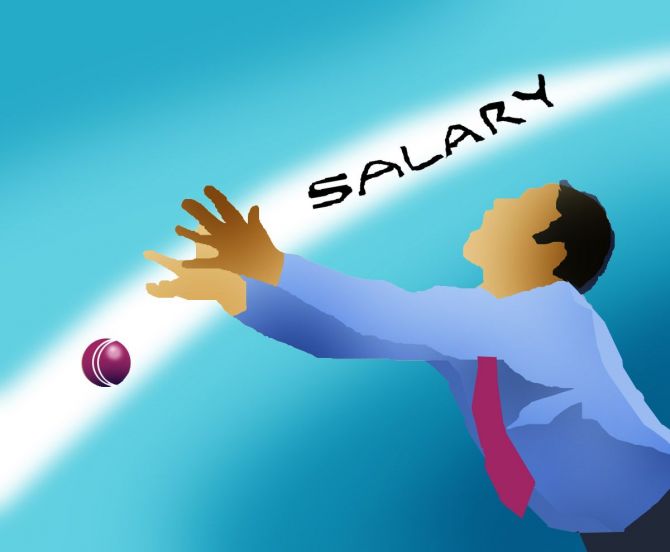Do you have financial planning queries?
You can ask rediffGURU Colonel Sanjeev Govila (retd) your questions HERE.
Colonel Govila is the founder of Hum Fauji Initiatives, a financial planning company dedicated to armed forces officers and their families.
He has over 12 years of experience in financial planning and is a SEBI certified registered investment advisor; he is also accredited with AMFI and IRDA.

Anonymous: Hello Sanjeev I have lost all the financial savings capabilities. I sold my only home 10 years ago when my mom passed away. I earn Rs 2 lakhs but still unable to save anything due to commitments. House rent, house related expenses, loans, child, school and other expenses. Can you please guide me here?
1. Start with understanding your financial situation by tracking your income, expenses, assets and liabilities.
2. Once you have a clear picture of your finances, create a budget and track your spending.
3. Once you have a budget, you can start to identify areas where you can cut back on your spending.
Try to distinguish between your needs and wants and try to cut out expenses on non-essentials. Even small changes can make a big difference over time.
4. Prioritise your debt repayment.
Debt can be a major burden, especially if you are struggling to make ends meet.
If you have debt, prioritise paying it off as quickly as possible, starting with high-interest debt.
5. Start saving and investing to create a contingency fund for unforeseen situations/expenses.
Having an emergency fund can help you avoid going into debt when unexpected expenses arise.
6. Start investing, even if it is a small amount.
Disciplined investment will help you accumulate funds for the time it required.
Investing is a crucial step toward securing your financial future and it's never too late to start.
Anonymous: Sir, my age is 35, my monthly income is Rs 61K, married with no child, plan to retire by 55, current savings only Rs 1.5 lakh.
Please suggest me how can I invest so as to make maximum corpus?
I know it's late and very less salary and savings, please suggest
I would suggest that you reduce your expenses in such a way that you can save at least Rs 15-20K per month for long term wealth creation through monthly SIPs in equity oriented mutual funds and increase your savings by 5-10 per cent yearly.
Kindly also make sure that you have enough liquidity in your savings bank account so that you do not need to redeem your mutual funds for at least 6-7 years from now for better capital appreciation.
Before you start investing, it is advisable to take guidance from a financial advisor who can understand your goals and requirements at different time intervals and align your investments with your requirements.
Ashutosh: If payment from the sale of property covers two financial years, how and when should capital gains tax be paid?
This is regardless of whether the entire sale proceeds are received in the same financial year.
For example, if you sell a property on March 31, 2023, and receive the entire sale proceeds on April 1, 2023, the capital gains tax will be payable in the financial year 2023-24. However, if you receive the sale proceeds in instalments, you can choose to pay the CGT on the instalments received in each financial year.
To calculate the CGT, you will need to determine the cost of acquisition of the property and the sale proceeds.
The cost of acquisition will include the purchase price of the property as well as any expenses incurred on its improvement.
The sale proceeds will include the amount received from the sale of the property as well as any other benefits received such as a waiver of stamp duty.
Once you have determined the cost of acquisition and the sale proceeds, you can calculate the CGT using the following formula: CGT = sale proceeds - cost of acquisition.
The CGT rate will depend on the type of property sold and the period of time for which it was held.
Long-term capital gains on the sale of property are taxed at a rate of 20.8 per cent (including cess). Short-term capital gains on the sale of property are taxed at the taxpayer's applicable income tax slab rate.
To pay the CGT, you can file a tax return and pay the tax due.
You can also choose to pay the tax in advance using the Challan 280 form.
Anonymous: If I have worked with various companies using same UAN, can I get pension after 10 years' of service?
Yes, you can get pension after 10 years of service even if you have worked with various companies under the same UAN.
The Employees' Pension Scheme allows employees to withdraw their pension after completing 10 years of service, regardless of whether the service is continuous or not.
To be eligible for EPS pension, you must meet the following criteria:
• You must have a UAN and your KYC details must be updated.
• You must have contributed to EPS for at least 10 years.
• You must have attained the age of 58 years.
Samrat: Sir my PF amount transferred to my new company from old company. But not credited to my company. UAN is different. Please help.
I would recommend the following steps if your PF amount has been transferred to your new company from your old company but has not been credited to your new company account:
• Check the status of your PF transfer. You can do this by logging into the EPFO website and checking your PF passbook. If you see that the transfer has been initiated but not completed, you can contact your old employer to find out why.
• Contact your new employer. They should be able to see the PF transfer request in their system and follow up with the EPFO to get it processed.
• Raise a grievance with the EPFO. You can do this online or by visiting your nearest EPFO office. Be sure to have your UAN, PF account number, and other relevant details handy.
• If your UAN is different from your old UAN, you will need to link them together. You can do this on the EPFO website.
• Once your PF transfer is complete, your new employer will start depositing your PF contributions into your new PF account.
• You can check the status of your PF contributions by logging into the EPFO website and checking your PF passbook.
- You can ask rediffGURU Colonel Sanjeev Govila (retd) your questions HERE.
Disclaimer: This article is meant for information purposes only. This article and information do not constitute a distribution, an endorsement, an investment advice, an offer to buy or sell or the solicitation of an offer to buy or sell any securities/schemes or any other financial products/investment products mentioned in this QnA or an attempt to influence the opinion or behaviour of the investors/recipients.
Any use of the information/any investment and investment related decisions of the investors/recipients are at their sole discretion and risk. Any advice herein is made on a general basis and does not take into account the specific investment objectives of the specific person or group of persons. Opinions expressed herein are subject to change without notice.










